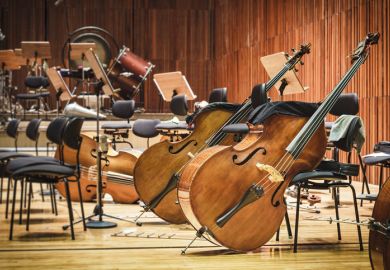Daniel Barenboim and Edward Said could be described as an Israeli and a Palestinian, but there is rather more to it than that.
Barenboim was born in Buenos Aires into a Russian-Jewish family who emigrated to Israel soon after the nation's foundation. His international career as pianist and conductor has taken him everywhere, but he now lives in Germany - to the discomfort of some of his fans in Israel - where he is conductor of the Staatsoper in Berlin. Said's family was Palestinian Christian. He was born in Jerusalem but grew up mostly in Cairo before moving to the US as a teenager. He now lives and teaches in New York, and so, like Barenboim, finds himself residing in a country that is regarded with considerable suspicion by many of his countrymen.
Both men therefore carry more convoluted cultural baggage than any single-word description of nationality can convey. They have what Barenboim refers to as "multiple identities" - identity being in Said's definition "a set of currents, flowing currents, rather than a fixed place or a stable set of objects".
This complex network of acquired sympathies perhaps lies behind something else they share, an antipathy for the prejudices and intellectual dogmas espoused by great numbers of their fellow Israelis and Palestinians. In 2001, Barenboim broke a longstanding taboo by performing in Israel sections of works by Wagner; the Nazi fondness for Wagner had created a de facto ban on his music since the second world war. And Said has argued passionately against those who oppose Palestinian "normalisation" with Israel, instead advocating recognition of the state of Israel and encouraging economic and cultural contact. In Parallels and Paradoxes , Said pertinently ties the two issues together: "In the Arab context, the campaign against 'normalisation' with Israel, while more urgent and actual a challenge - after all, Israel is practising modes of daily collective punishment and murder against an entire people, whose land it has illegally occupied for 34 years - has some similar features with the Israeli taboos against Palestinian poetry and Wagner." Neither, in Said's view, is justifiable or even particularly efficacious in achieving its apparent goal.
So the friendship between Barenboim and Said is not so much an illustration of Blake's dictum that "opposition is true friendship" as the union of a pair of cultural hybrids who are in many ways similar. And as Said is, in his own description, a "serious amateur musician and pianist" who has written extensively on music, they also have music in common, which has occasioned them being asked to share a platform from time to time since 1995 to converse in front of an audience. Parallels and Paradoxes is the record of some of those encounters.
As such, it shares some of the problems of similar books. The different audiences would have received as novelties Barenboim and Said's pearls. Not so the reader, present at all six conversations and aware when the two are repeating themselves - which happens quite a lot. But if one accepts this limitation, as well as the rather inelegant structure (six conversations with a little essay from each tacked on at the end), there is plenty to be gleaned from their exchanges.
Exchange, in fact, is a concept that looms large, explicitly in connection with the American problem and current global strife. Speaking of the post-cold war world, Barenboim claims there is "a sort of quiet underlying sense of triumph in American thinking about the development of the world".
Said elaborates: "There is an uneasy sense that America should be homogenised, and that there are these 'other' people out there - whether you call them Mexicans or blacks or Africans, and so on - that either have to be kept at bay or absorbed... there isn't a healthy exchange between self and 'other'."
It was in the spirit of exchange, then, that in 1999 Barenboim and Said collaborated on a project to bring Israeli and Arab musicians to Weimar to form an orchestra. The location was laden with symbolic significance: the home of Goethe and German cultural enlightenment, but close, too, to the death camp at Buchenwald. "Nobody could fully comprehend the proximity of such sublimity to such horror," Said says. The exercise sounds a little like group therapy, with participants forced to confront their prejudices, near walk-outs followed by grudging decisions to stay, and a final arrival at a fragile new level of understanding. Barenboim concludes that the musicians had been confronted with an "other" about whom their ignorance was profound, and "if we foster this kind of contact, it can only help people feel nearer to each other". We should all hope his optimism is well founded.
As well as detailing such heroic endeavours as the Weimar experiment, and touching on authenticity in musical performance (amusingly likened by Said to religious fundamentalism), the irreconcilability of politics and art, and Beethoven's late style, Parallels and Paradoxes contains much discussion of that interminably discussed man, Wagner. "For a mature mind," Said writes in his illuminating final essay, "Barenboim and the Wagner taboo", "it should be possible to hold together in one's mind two contradictory facts: Wagner was a great artist and, second, that Wagner was a disgusting human being." Barenboim agrees, and had the guts to play Wagner in Tel Aviv, where one of the audience approached him to say: "How can you want to play that? I saw my family taken to the gas chambers to the sound of the Meistersinger overture."
But anti-Semite as he was, Wagner is for Barenboim a crucial and unavoidable test of cultural tolerance. "One has to be very clear about how one deals with one's enemies and with the people who hate us and who have hated us over the centuries," the pianist says to Said. "You can either come to terms with them or you can continue to have no contact with them."
Barenboim and Said's way is to come to terms.
Christopher Wood is a freelance journalist specialising in music.
Parallels and Paradoxes: Explorations in Music and Society
Author - Daniel Barenboim and Edward W. Said
ISBN - 0 7475 6376 4
Publisher - Bloomsbury
Price - £16.99
Pages - 186
Register to continue
Why register?
- Registration is free and only takes a moment
- Once registered, you can read 3 articles a month
- Sign up for our newsletter
Subscribe
Or subscribe for unlimited access to:
- Unlimited access to news, views, insights & reviews
- Digital editions
- Digital access to THE’s university and college rankings analysis
Already registered or a current subscriber?



